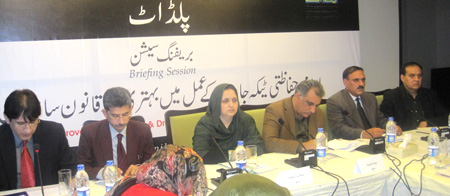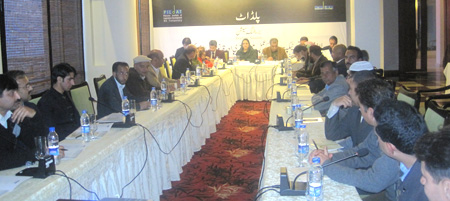|
|
| |
| EVENTS |
|
|
> Briefing on the Benefits for Immunization
|
|
|
| |
|
Immunization Awareness
February 22, 2011
Muzaffarabad
|
|
| |
Muzaffarabad, February 22: Azad Jammu and Kashmir�s Health Minister Dr. Muhammad Najeeb Naqi Khan said that return of polio to Pakistan is alarming and needed to be tackled by collective efforts at official and civil society levels. He was speaking to a select gathering of legislators, government officials, representatives of non-governmental organizations and media at a special briefing organized by PILDAT on Monday. |
|
| |
The briefing was chaired by AJK Legislative Assembly�s Deputy Speaker Ms. Mehrun Nisa
|
|
| |
Resurgence of polio in Pakistan, Dr. Najeeb Naqi Khan said, had led to the launch of an emergency plan by the President of Pakistan which was being supported by the entire world. At the same time, he noted with satisfaction, the immunization coverage in AJK was 100 per cent and there had not been any single instance of a polio case in the region. �We do not need to improve but maintain and sustain this coverage,� he said, asking the members of the AJK Legislative Assembly to support the campaign. Dr. Najeeb Naqi Khan thanked PILDAT for organizing the briefing to raise the awareness level of policy and opinion making circles and vowed that his ministry would leave no stone unturned in rendering its responsibilities in this regard. |
|
| |
Earlier, PILDAT�s Project Manager Mr. Faheem Ahmed Khan threw light upon the background of the session, recalling the formation of a parliamentary caucus in the AJK Legislative Assembly on promoting immunization. He said the special briefings were aimed at involving the legislators, civil society activists and media representatives in the process of creating awareness among the masses with regard to the most important task of immunization. |
|
| |
Following him, Mr. Azhar Abid, Health Specialist of the UNICEF briefed the audience, with the help of a slideshow, on the benefits of immunization, saying it was the most cost-effective health investment which averted around 2 to 3 million deaths across the globe every year. Immunization is a proven tool for controlling contagious diseases, Mr. Abid said, and acknowledged that AJK was doing very well in this regard |
|
| |
Dr. Sardar Shabbir, Provincial Programme Manager, Extended Programme for Immunization (EPI), and Dr. Sabir Abbasi, District Health Officer Muzaffarabad, spoke about the role of the AJK health department in improving the immunization campaign. Dr. Shabbir informed the audience about general and specific objectives of the campaign and said AJK was a polio free area for the past 10 years whereas in Pakistan 19 polio cases had come to fore by July 2010. The DHO also underlined the importance of immunization, saying no foreign country would grant entry on its soil without ensuring that the visitor had been immunized. |
|
| |
During the question-answer session, journalist Asif Raza Mir asked if PILDAT had any plans to disseminate this message to the rural area population. Responding, Dr Najeeb pointed out that PILDAT�s mandate did not include reaching out the masses but to take the lawmakers on board who in turn could assume a supervisory role for successful execution of immunization campaign. The minister pointed out that AJK�s distinction of being a polio free region was not a self-proclaimed accolade but it had been certified by a number of national and international organizations and agencies. |
|
| |
When Minister for Education Sardar Farooq Ahmed Tahir asked if the bill on immunization had been introduced in any other country of the world, he was reminded by Dr. Najeeb that it was resurgence of polio in Pakistan that had necessitated some sort of legislation for its eradication. �It is a hazard which can isolate us from the rest of the world,� Dr Najeeb said adding, �PILDAT had suggested legislation to make immunization mandatory for the very reason.� |
|
| |
Mohammad Nasim Khan, an official of the assembly secretariat, asked if the suggestions given at earlier sessions in Muzaffarabad had been incorporated in the proposed law, PILDAT�s Project Manager Faheem Ahmed Khan said the proposed bill draft had been indeed prepared keeping in view the need and had been reviewed by legislators from all 8 legislatures including AJK and GB besides Provincial Assemblies and Parliament of Pakistan.
In response to a question by Raja Nisar Ahmed, another official of the assembly secretariat, Health Minister said that making immunization mandatory in schools was because of an impression, being spread in some areas, that the vaccines were being sent by the Westerners to affect fertility of the Muslims. The Minister agreed with Tariq Naqash, a senior journalist, who pointed out that if the birth registration of newborns was made mandatory, timely immunization of children could be easily ensured. He said local governments were being involved in this process with assistance from the UNICEF. Mr. Naqash went on to suggest that since the villagers trusted and listened to their respective clergymen more than any other person, the latter should also be taken on board to remove the misconception of rural population about immunization. On this, Dr Shabbir said that his office had been spreading leaflets among teachers and prayer leaders in the rural areas about the significance of immunization.
When asked why the AJK Assembly could not take lead in passing the proposed bill on immunization like that of recently enacted Child Protection Bill, Dr. Najeeb Naqi Khan pointed out that since AJK did not face any threat to immunization it had not considered legislation for the purpose as a priority. �However, if need be we can pass the bill even before any other legislative body does so,� he added.
The briefing came to end with a word of thanks and appreciation by the Deputy Speaker Ms. Mehrun Nisa. She expressed the hope that the audience will carry forward the message in their respective spheres of influence. |
|
| |
|
|
| |

|
|
| |
|
|
| |

|
|
|
|
|
|
|
|
|